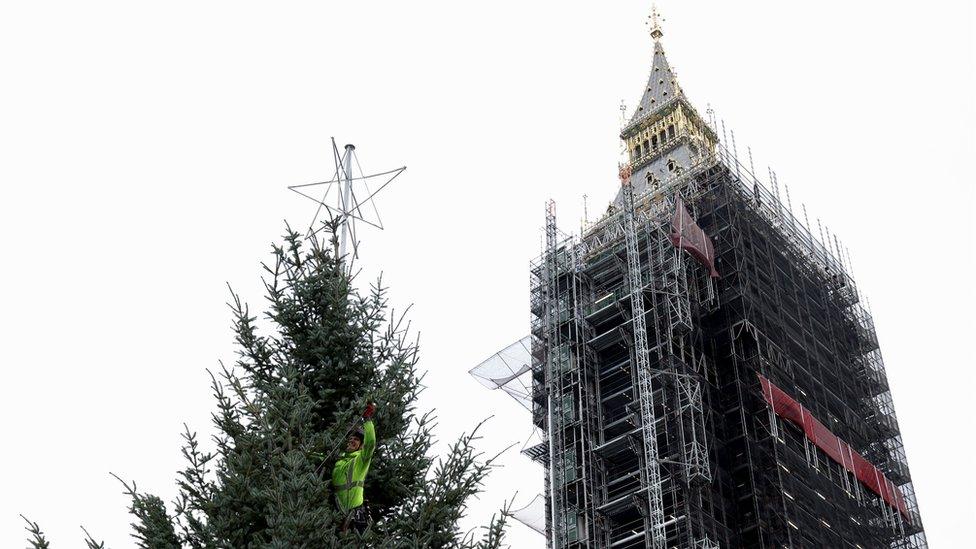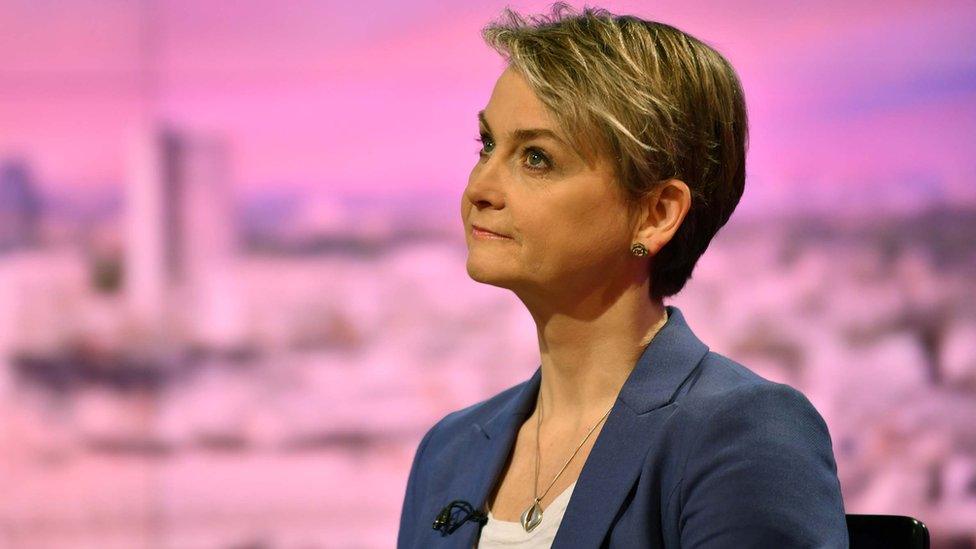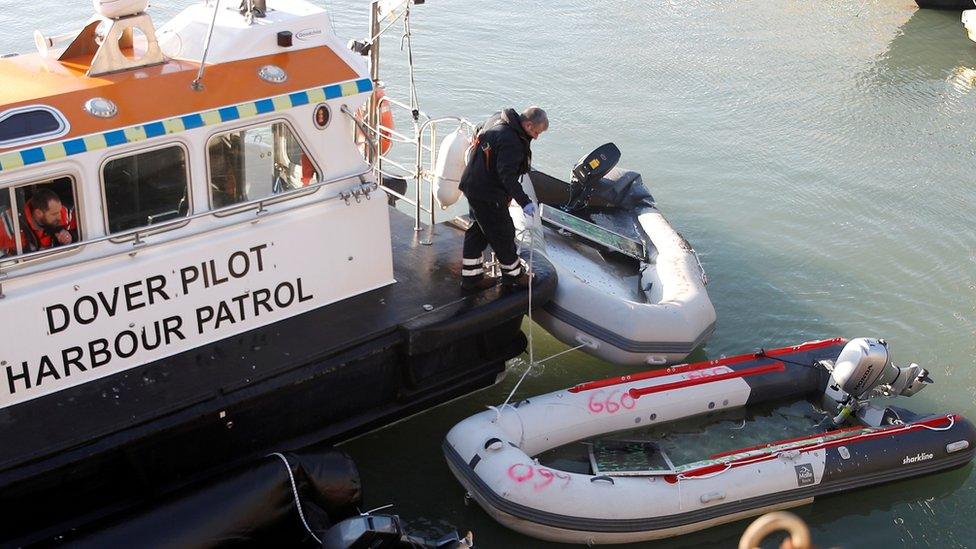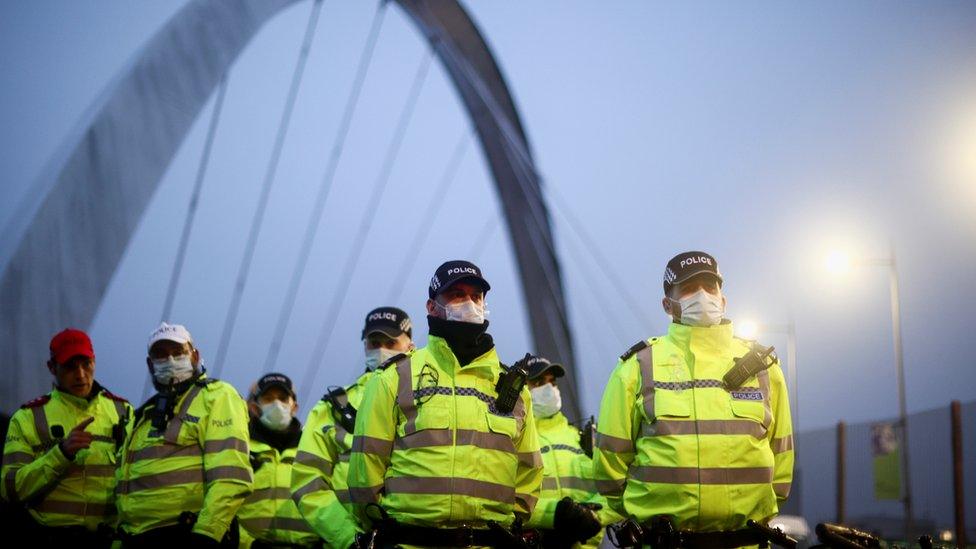What's coming up in Parliament next week?
- Published

Next week's Westminster agenda is dominated by debates on the detail of two mega-bills.
The Nationality and Borders Bill returns to the Commons, whilst the Lords continue their scrutiny of the Police, Crime, Sentencing and Courts Bill.
Peers have so far inflicted 35 defeats on the government this year, and despite the tightening political balance, are expected to inflict a few more as the bill embarks on six days of report stage consideration.
Elsewhere, watch out for jockeying for position in the race to replace Yvette Cooper as chair of the Home Affairs Select Committee - one of the most high-profile jobs in the Commons - after she returned to the Labour front bench.
Nominations close on Tuesday 14 December, with the election the following day - so expect to see the aspirants popping up with carefully-honed questions, designed to maximise cross-party support.
Only Labour MPs can be candidates, but all MPs have a vote.
So far, committee member Dame Diana Johnson has been mentioned as a possible candidate, along with Hilary Benn, Rupa Huq, and Yasmin Quereshi.

Yvette Cooper held one of the biggest committee jobs in the House of Commons
Monday 6 December
The Commons week opens at 14:30 GMT with an hour of Education questions - providing a debut for the new shadow education secretary Bridget Phillipson. Then look out for any government statements or urgent questions.
The main legislative action is consideration of Lords amendments to the Armed Forces Bill, the measure which allows the Army, Navy and RAF to continue to operate.
Peers voted through a couple of important changes in the teeth of government resistance, including on trying serious criminal charges against service personnel in the civil courts rather than by courts-martial.
Given a recent report by the defence select committee on women in the armed forces also recommended the same move, keep an eye on how Conservative members of the committee vote.
Then there's the second reading debate on the (not very controversial) Dormant Assets Bill, which will release money held in forgotten financial assets.
In Westminster Hall (16:30), MPs debate an online petition calling for more spending on research into Fibrodysplasia Ossificans Progressiva (FOP), a rare genetic disorder.
In the Lords (14:30), forty minutes of questions to ministers range across making misogyny a hate crime, and the possible Chinese takeover of a strategic technology company.
There's a brief third reading rubber-stamping of the not very controversial Public Service Pensions and Judicial Offices Bill, followed by the report stage for the Animal Welfare (Sentience) Bill.
Tuesday 7 September
The Commons day begins (11:30) with Treasury questions, after which the former health secretary Matt Hancock presents a ten-minute rule bill to introduce dyslexia screening in primary schools.
Then MPs begin two days of detailed scrutiny on the Nationality and Borders Bill.
As ever with this phase in the consideration of a bill, much depends on the amendments selected for debate by the chair, and the smaller number which will actually be voted on - and the way the debate is timetabled across two sitting days.
The Joint Committee on Human Rights has been very active in scrutinising this bill, and the JCHR duo of Harriet Harman and Joanna Cherry have put down a series of amendments reflecting the conclusions of its recent report into the bill.
This warned that the new measures to criminalise and disincentivise attempts to enter the UK without a visa or immigration leave breach human rights law and the Refugee Convention.
There's a galaxy of further amendments, with more appearing by the hour.

The bill has come under renewed scrutiny due to the small boats crisis in the English Channel
The ones that seem to command the most backbench support include New Clause 8, which would prevent the Home Office from charging a fee when registering as a citizen which exceeds the cost of processing the application. It would also get rid of all such fees for certain looked-after children.
Another, New Clause 9, would compel the government to issue physical certificates for people registered under the EU settlement scheme.
And Amendments 5 and 6 would make clear that handing in information late would not count against the credibility victims of modern slavery.
My eye was caught by an amendment mostly supported by opposition MPs - but that has also been signed by former Conservative cabinet minister David Davis and Andrew Mitchell - that would delete provisions allowing asylum claims to be processed in another country.
Meanwhile, backbench Conservatives Sir Christopher Chope and Philip Hollobone have a new clause to create offences of entering the UK illegally and remaining without legal authority.
There are a number of changes proposed that give various groups new rights of access to the UK.
Conservative MP Damian Green, supported by foreign affairs committee chair Tom Tugendhat proposes a new clause allowing people from Hong Kong who have at least one parent with British National Overseas (BNO) status to apply for the BNO visa.
Others cover residence rights for all former British-Hong Kong service personnel, plus their families, and people born before 1983 on the British Indian Ocean Territory.
There will certainly be grumbles about the late arrival of new government amendments, but they make some significant changes.
For example, creating a new exemption from the provisions targeting people facilitating illegal entry, so that they do not apply to volunteer groups rescuing people at sea.
There is also a series of changes to the rules on how immigration tribunals should deal with late-arriving evidence, or with claimants who have shown bad faith.
On the committee corridor, Digital, Culture, Media and Sport (10:00) follows up its harrowing evidence from former Yorkshire cricketer Azeem Rafiq, with witnesses from the National Asian Cricket Council, and the Quaid-e-Azam Premier Cricket League.
Later (11:00), MPs will also hear from former sports minister Tracey Crouch, who chaired a recent review into football governance.
Social care stand-off?
The Lords opens (14:30) with questions to ministers on clamping down on late payments to small businesses, and on kitten and puppy smuggling.
Then comes the second reading debate for the Health and Social Care Bill, which restructures the NHS in England, reversing the previous arms-length approach that distanced ministers from detailed management decisions.
Watch the former health secretary Lord Lansley, architect of the present system, during these debates; he's on record agreeing that some parts of his overhaul do need reform.
This will be a major event, with 76 peers down to speak as I write, and the major issue looks certain to be the operation of the personal £86,000 lifetime cap on care costs.
There could well be a stand-off with the Commons at some point in the new year, if a cross-party alliance of peers can be assembled to press changes (it would probably need a number of Conservatives), and the government uses its Commons majority to reject them.
Wednesday 8 December
MPs begin (11:30) with half an hour of Northern Ireland questions, with Peter Kyle making his debut as shadow Northern Ireland secretary followed at noon by Prime Minister's Questions.
Then MPs resume their trawl through the detail of the Nationality and Borders Bill, culminating in what will probably be a perfunctory third reading debate.
If time allows, that will be followed by a Labour opposition day debate on a motion to be announced.
Committee action includes Transport (09:30) hearing from senior industry figures about the problems besetting the road freight supply chain.
Work and Pensions (09:15) put up the mistletoe to quiz Work and Pensions Secretary Thérèse Coffey in a general session covering all her work. And Women and Equalities (14:30) takes evidence on menopause and the workplace.
In the Lords (15:00), ministers field questions on how the government is allocating "levelling-up" funding, and building a national memorial to victims of the Covid pandemic.
Peers will then consider whatever the Commons has done with their amendments to the Armed Forces Bill.
But the main event is the first of a planned six days of report stage consideration of the Police, Crime, Sentencing and Courts Bill.
This is the point in the life-cycle of a bill before the Lords where the real action takes place, as cross-party coalitions are built to press amendments on key points of detail.
At the moment, it looks like a quiet first day, possibly without any votes.

New powers in the policing bill have proved controversial among campaigners and opposition politicians
The government - with opposition support - will introduce amendments to implement the law named after PC Andrew Harper, to introduce mandatory life sentences for the killers of emergency service workers.
And there will also be a government concession to include violence against women and girls in the serious violence reduction duty on public authorities like local councils.
The second and third days of report stage follow in the week before Christmas - but the most contentious votes, on the new public order powers the government wants to add to the bill, are expected to take place in the New Year.
Thursday 9 December
Commons business opens (09:30) with forty minutes of Environment, Food and Rural Affairs questions, with another shadow cabinet debut, this time from Jim McMahon, newly shifted from the transport brief.
There will be a short debate on the defence committee's report on women in the armed forces - after which the action on this issue switches to Westminster Hall (15:00), where there will be what promises to be a well-attended debate on the report.
Back in the main chamber, there will be two backbench business committee debates: the first on the contribution of financial services to the UK's economy, and the second on consular support to British citizens.
In Westminster Hall, the opening debate (13:30) sees Lib Dems Wera Hobhouse and Sarah Olney discuss the UK's transition to electric vehicles by 2030 - after which the debate on the defence committee's report follows.
The Lords begins (11:00) with questions on the UK contribution to UN relief work in Palestine, and ensuring the viability of small family farms.
The day's debates, on subjects chosen by backbench Conservative peers, are on Scotland's contribution to economic recovery and on the role of civil nuclear power (led by Thatcher-era energy secretary Lord Howell).
There will also be a short debate on emergency funding for Transport for London, led by Labour's Lord Davies of Brixton.
Friday 10 December
It's private members' bill day in the Commons (09:30), with Labour MP Jeff Smith's bill on access to medical cannabis up first for its second reading.
Second on the agenda is the SDLP Leader Colum Eastwood's Climate Change Bill, which requires the government to declare a climate emergency and bring forward the date by which the UK is required to achieve net-zero greenhouse gas emissions.
This looks like a classic example of the kind of private members' bill designed to raise an issue, rather than to become law; the sheer sweep of its ambition is well beyond the normal range of this type of legislation.
I would be a bit surprised, therefore, if the third bill on the list, the British Goods (Public Sector Purchasing Duty) Bill, proposed by Labour's John Spellar, got much, if any debate - but it did allow him to raise the issue at Prime Minister's Questions.
In the Lords (10:00), Archbishop of Canterbury Justin Welby has his annual Lords debate - and his chosen subject is challenges to freedom of speech.
In the past, he has warned that freedom of belief and freedom of speech are menaced by the chill that comes from constraining their expression, and he is expected to talk about the need to nurture culture of civility - which can't simply be legislated into existence.
The Bishop of Oxford is also speaking, and will be focusing on the digital environment.
